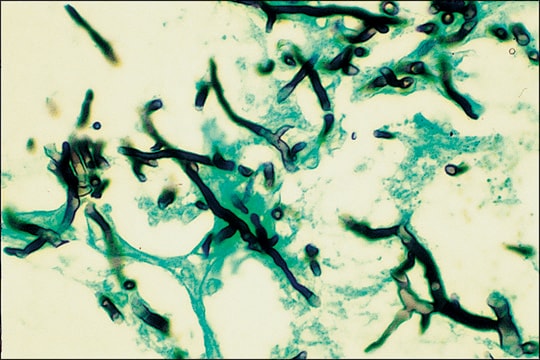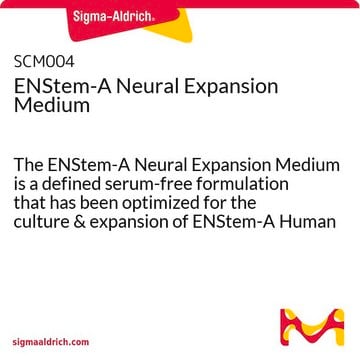Recommended Products
form
liquid
Quality Level
usage
sufficient for ≥100 slides staining and fixing
application(s)
diagnostic assay manufacturing
hematology
histology
storage temp.
2-8°C
Application
Silver Enhancer Kit has been used to determine the presence of gold nanorods in various tissues and to prepare silver enhanced gold colloids for electron microscopy.
Features and Benefits
Colloidal gold labels are normally visible only at the electron microscope level. Silver Enhancer enlarges the gold colloid label by precipitation of metallic silver to give a high contrast signal visible under a light microscope. A darkroom is not necessary for this procedure, as the silver enhancer working solution is light-stable for 20-30 minutes under ordinary laboratory lighting.
Packaging
The Silver Enhancer kit consists of Solution A (silver salt), Solution B (initiator), Sodium Thiosulfate (fixer), and a Technical Bulletin describing their use.
Principle
Solution A and Solution B are mixed 1:1 immediately before use and applied to the slide holding the gold-labeled section. After 5-10 minutes, the slide is rinsed with distilled water, fixed for 2-3 minutes in a sodium thiosulfate solution, and rinsed again. The section is now ready for counterstaining and mounting as required.
Kit Components Only
Product No.
Description
- Sodium thiosulfate pentahydrate, reagent grade, ≥99.5% 500 g
Signal Word
Danger
Hazard Statements
Precautionary Statements
Hazard Classifications
Aquatic Acute 1 - Aquatic Chronic 1 - Repr. 1B
Storage Class Code
6.1C - Combustible acute toxic Cat.3 / toxic compounds or compounds which causing chronic effects
Flash Point(F)
Not applicable
Flash Point(C)
Not applicable
Choose from one of the most recent versions:
Already Own This Product?
Find documentation for the products that you have recently purchased in the Document Library.
Using Immuno-Scanning Electron Microscopy
for the Observation of Focal Adhesion-substratum
interactions at the Nano- and Microscale in S-Phase Cells
for the Observation of Focal Adhesion-substratum
interactions at the Nano- and Microscale in S-Phase Cells
Manus J.P. Biggs
Cell Culture Labfax (2011)
Kathleen Grennan et al.
Talanta, 68(5), 1591-1600 (2008-10-31)
With lower limits of detection and increased stability constantly being demanded of biosensor devices, characterisation of the constituent layers that make up the sensor has become unavoidable, since this is inextricably linked with its performance. This work describe the optimisation
Tsung-Ting Tsai et al.
Scientific reports, 7(1), 3155-3155 (2017-06-11)
In this study, we investigated the antibacterial activity of silver-coated gold nanoparticles (Au-Ag NPs) immobilized on cellulose paper. Ag NPs are known to have strong antibacterial properties, while Au NPs are biocompatible and relatively simple to prepare. We made the
A histological evaluation and in vivo assessment of intratumoral near infrared photothermal nanotherapy-induced tumor regression
Hadiyah N
International journal of nanomedicine (2014)
Yuan Chen et al.
Oncotarget, 9(41), 26556-26571 (2018-06-15)
Tumor hypoxia is a well-recognized driver of resistance to traditional cancer therapies such as chemotherapy and radiation therapy. We describe development of a new nanoconstruct composed of gold nanorods (GNRs) conjugated to carbonic anhydrase IX (CAIX) antibody that specifically binds
Our team of scientists has experience in all areas of research including Life Science, Material Science, Chemical Synthesis, Chromatography, Analytical and many others.
Contact Technical Service










